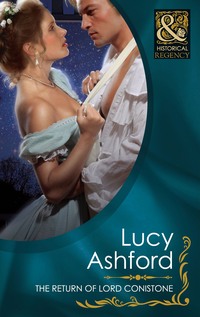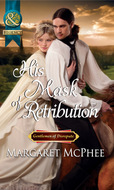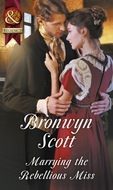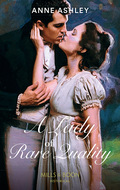Książki nie można pobrać jako pliku, ale można ją czytać w naszej aplikacji lub online na stronie.
Czytaj książkę: «The Return of Lord Conistone»

Praise for Lucy Ashford writing as Elizabeth Redfern
THE MUSIC OF THE SPHERES
‘Unputdownable…[a] remarkable debut…
a glittering tale of London in 1795,
full of science, intrigue, war, revolution,
and obsessive passion’.
—Guardian
‘An engrossing read and a rich,
pungent evocation of the period’.
—Observer
‘…brilliantly handled to keep the reader guessing
right to the end’.
—Charles Palliser
‘Striking and original…a star is born’.
—Literary Review
‘Quite wonderful… It is Redfern’s ability to bring
each scene, each character alive that makes this
such toothsome reading’. —USA TODAY
AURIEL RISING
‘Intelligent’.
—New York Times
‘Richly atmospheric…Redfern’s strength is in
re-creating a morally corrupt world…’
—Publishers Weekly
‘Will you keep your trust in me, whatever you hear? Will you remember we are friends?’
Friends. Verena’s heart plummeted, but she managed to say lightly, ‘Good friends, indeed’.
Lucas nodded almost curtly, then took her hand and pressed his lips to it. She wanted to fling herself in his arms and cling to him and never let him go.
As he walked towards his waiting horse he turned to her one last time, as if he was about to say something else. But then he mounted up, gave a half-salute, and was gone.
She’d thought— everybody had thought—that he’d gone back to the battlefields of the Peninsula. But news came a few weeks later that he’d resigned from the army and was instead living the high life in London, with the Prince’s set. After that came whispers, too, of secret affaires with beautiful society women. And each piece of news about Lord Lucas Conistone stabbed Verena to the heart.
About the Author
LUCY ASHFORD, an English Studies lecturer, has always loved literature and history, and from childhood one of her favourite occupations has been to immerse herself in historical romances. She studied English with history at Nottingham University, and the Regency is her favourite period.
Lucy has written several historical novels, but this is only her second for Mills & Boon®. She lives with her husband in an old stone cottage in the Peak District, near to beautiful Chatsworth House and Haddon Hall, all of which give her a taste of the magic of life in a bygone age. Her garden enjoys spectacular views over the Derbyshire hills, where she loves to roam and let her imagination go to work on her latest story.
A previous novel from Lucy Ashford:
THE MAJOR AND THE PICKPOCKET
AUTHOR NOTE
I remember a fantastic history teacher at school, who held us spellbound with her tales of the Napoleonic wars. I’ve often wondered since if the tremendous appeal of the Regency lies in the contrast between the sparkle and glamour of upper-class life in London and the incredible danger faced by so many brave men during that long, long campaign against the French.
One of the most fascinating battles, for me, was Busaco, in Portugal, where in 1810 Wellington’s soldiers fought for their very survival. Wellington won, thanks largely to his courageous intelligence officers. And all this—you’ve guessed it—gave me the inspiration for my second historical for Mills & Boon, in which my hero, Lord Lucas Conistone, has apparently abandoned his army career to live the life of a rake with the Prince’s set.
Along the way he has broken Verena Sheldon’s heart. But is Lucas really what he seems? Why is he so interested in the journeys Verena’s explorer father made in Spain and Portugal? Gradually, amidst much heartache, Verena realises how Lucas, in the cruellest possible way, has been forced into an almost impossible choice—between his duty to his country and his abiding love for her.
I do hope you enjoy their story!
THE RETURN OF
LORD CONISTONE
Lucy Ashford

MILLS & BOON
Before you start reading, why not sign up?
Thank you for downloading this Mills & Boon book. If you want to hear about exclusive discounts, special offers and competitions, sign up to our email newsletter today!
Or simply visit
Mills & Boon emails are completely free to receive and you can unsubscribe at any time via the link in any email we send you.
For my alpha-male, AJR— who not only helped with the research, but also provided endless cups of tea.
Prologue

May 1810—Portugal
His four men huddled round a meagre fire and played cards for escudos. But Lucas Conistone stood apart, his hooded grey eyes scanning the peaks like a hawk’s as the fiery sun set over the mountains, the iron wind tugging at his tousled black hair and his travel-worn clothes.
Here, he’d been told. Here was the meeting place. If it was a trap, he was ready. His hand went to the pistol in his pocket and softly caressed the cold metal.
And then he turned round quickly, and his men also were on their feet, because someone was hurrying along the rocky path to this isolated mountain pass, a silhouette against the blood-red sun.
Lucas gestured to his men to sit again as he recognised the small, sinewy figure coming straight for him. ‘Como vai, Miguel?’ he said softly in fluent Portuguese. ‘I hear you have news’.
The man called Miguel grasped his hand, his dark head barely up to Lucas’s powerful shoulder, and said in the accent of the Portuguese mountain people, ‘News, yes, meu amigo. The body of the Englishman has been found at last’.
After nearly a year and a half of searching. ‘Where?’
‘He must have been swept downstream by the flood waters of the River Vouga. His body was trapped under rocks, and rotted in the water as the months went by—a suitable end, nao? And—this was found on him’. Miguel handed Lucas a small package; something saved, miraculously, from the water by the oilskin in which it was tightly wrapped.
Swiftly Lucas tore the package open.
A compact, leather-bound journal. And the first entry was dated—September 1808.
No. He wanted to shout his protest across the mountains. No. Where was the old one, the previous one?
He flicked through it—two, three pages only, of hurried notes. The rest was blank. A blow indeed.
Wild Jack, I have followed you to hell and back for this.
Curtly he held out silver coins to the man Miguel. ‘Where is the body now?’
‘We buried what was left of it, Inglês. For the spies of Napoleon Bonaparte are on the trail’. He looked up at Lucas slyly. ‘And they offer our people rewards also’.
Lucas clenched his teeth. ‘And what exactly have your people told them, Miguel?’
The man gave a crooked smile. ‘Why, we babbled of treasure. The old, old legend of gold buried somewhere in the steep hills high above Coimbra. Isn’t that, after all, what the English traveller you call Wild Jack died for?’
Let the French believe that, thought Lucas swiftly. Let the Portuguese, like Miguel, believe it. He was scanning the diary’s sparse contents: ramblings of a sea voyage from England, of a swift ascent into the mountains. The writings of a man knowing he was being pursued, and that the end was near.…
Already he was turning to his waiting men. ‘Get your things together. We’re heading homewards’. They moved instantly to roll up their thin blankets and tie them to their packs.
But the man Miguel pointed suddenly at the blood that stained Lucas’s shirt, all too visible where his long coat had fallen open. ‘You have been wounded, Inglês. Stay with us in the mountains for one night at least! We have food we can share’. Miguel’s black eyes gleamed mischievously. ‘And our girls—pretty girls, eh?—will be only too happy to make a man as handsome as you forget the perils of war!’
‘Obrigado, meu amigo, but it’s nothing’. Grimly Lucas pulled at his coat to hide the bloodstain.
‘An ambush?’
‘Of sorts. We had a run in with some French outriders on our way up here’.
‘Did they live to tell the tale?’
Lucas was already turning to go, but he swung round one last time. ‘What do you think?’
Miguel grinned. ‘They did not. You’ll be back soon with the key to the treasure, Inglês?’
‘I hope so,’ Lucas breathed. ‘For if others get it first, we are lost indeed’.
So Lucas Conistone and his companions set off down the barren slope, each of them as lithe and hard-muscled as any of the Portuguese who herded goats on the sparse spring grass of these high mountains. Lucas’s men were intent on their route, sometimes cursing softly under their breath at the difficulty of the terrain.
But their leader was thinking of another time. Another place.
Of the Hampshire countryside in early autumn. Of the English sun, warming a flower-scented garden whose acres of lawns swept down to the cliff’s edge, where the azure sea gleamed far below. Of a time when he’d thought he’d found love, and a purpose to his life.
But then the vision was gone, the dream over. And he was back in this foreign land, clambering down a treacherous path in the knife-sharp night air, with an almost impossible task facing him.
He was remembering, too, the last words spoken by a man about to die. Look after her for me, will you, Lucas? Tell her I did it for Wycherley. For all of them.… For God’s sake, look after Verena.
Chapter One

Early July 1810—Wycherley, Hampshire
‘They are ruined, you know,’ whispered the malicious female voice, ‘quite ruined! But, my dears, what can you expect, with four daughters and a father who was hardly ever here?’
Verena Sheldon froze, hidden from the three gossiping old busybodies by an ornate lacquered screen to which she was tying a label. ‘Three guineas,’ the label read. ‘Or nearest offer’.
Like everything else in Wycherley’s great hall, it was for sale. Like everything else—herself and her family included, it seemed—it was up for inspection, assessment and—condemnation.
During all this hot July day, neighbours, dealers from Chichester, and local businessmen with their wives and families had rolled up Wycherley’s long drive in carriages or on horseback. Some had also brought servants with open drays ready to cart their purchases away. Every hour Verena had seen the precious memories of her past and all her hopes for the future slipping away.
She put her hands to her burning cheeks as the vicious whispering went on.
‘Such a foolish woman, that Lady Frances,’ continued the rancid female voice. ‘And the way she’s brought up all those daughters of hers, with such airs and graces! Why, my dears—’ a cackling sound followed ‘—to think that only a short while ago her ladyship was boasting that her eldest was being courted by the Earl of Stancliffe’s heir! One would laugh, if it weren’t all so pitiable! Oh…’.
She trailed off as Verena Sheldon marched out from her place of unintended concealment, her amber-coloured eyes flashing fire.
‘Good afternoon, ladies!’ She squarely faced the Chichester tabbies. ‘Do you know, I somehow expected you would be here! Mrs Marsham, how did your daughter’s London Season go? Plenty of suitors—well, of course—and she’s engaged to….? Oh, I see, no one suitable yet, well, never mind…. Do, pray, enjoy the rest of your spying—I’m sorry, buying!’
The gossiping trio went off rather hastily, muttering. But everyone else continued to prowl round the hall, poking and prodding at the furniture, paintings and ornaments that had all been an integral part of Wycherley, her beloved home.
Verena found to her dismay that a great lump had risen in her throat. The vultures were everywhere. She even saw, through the crowds, one bold, shabbily dressed fellow with spiky black hair pulling out the drawers of an old walnut cabinet and bending to peer into the empty recesses. Really! Indignation welling again, she started pushing through the crowds towards him, but was distracted anew by the sight of a couple of porters going by with a delicate inlaid table. ‘No!’ she blurted out. ‘My father’s chess table—’
Her brother-in-law David Parker, who owned a farm that adjoined the coast road to Framlington, was quickly at her side. He’d been helping all day, and now she clutched at his arm. ‘David, we cannot let that go!’
‘We have to sell as much as possible before the bailiffs move in, I’m afraid, Verena. And it has been sold for the asking price,’ David said gravely.
The man who was buying the table—a dealer—broke in. ‘Which is more than you’ll get for this pair of Chinese vases just here!’ He was picking one up, to weigh it casually in his hand. ‘No more Chinese than I am, I’d say!’ He turned to David. ‘I’ll give you a guinea for the pair on top of the three guineas for the table, and that’s being generous’.
David hesitated, glanced at Verena, then nodded. The dealer hurried off to gather more booty.
Verena bit her lip. I won’t cry. When I heard about Lucas, I vowed that I would never, ever cry again.
Once the contents were sold, the house would have to go too. Mr Mayhew, the family’s attorney, had told her that. Kind Mr Mayhew was here now, collecting payments at a desk by the door and issuing receipts. Earlier he’d taken Verena aside and said, ‘You do realise, don’t you, Miss Sheldon, that there is actually a potential buyer for the whole estate?’
‘The Earl. Yes’. Her voice, miraculously, was steady. ‘And I had rather it went to anyone else!’
Mr Mayhew had glanced at her over his spectacles and sighed. ‘Very well. Very well…. But take my advice, my dear Miss Sheldon, and don’t make this harder than it needs to be. No need for you to attend the dispersal sale; your brother-in-law Mr Parker and I will manage the business perfectly well, I do assure you’.
But Verena believed that someone had to represent their family! Her one sensible sister, Pippa, married to David, was at home looking after their twin baby boys. Verena’s other sisters, Deb and Isobel, were up in their bedrooms, and both of them, like their mother Lady Frances, were loudly lamenting the collapse of their family fortunes—about as useful as leaking buckets, the three of them.
Lady Frances had tackled Verena before the sale began. ‘Verena, there will be gentlemen here this afternoon! Some of them with prospects!’ She’d glanced waspishly at Verena’s day gown of brown cambric, its only adornment the tiny mother-of-pearl buttons running firmly up the bodice to her throat. ‘Now, I know that your looks bear no comparison to Deb’s or darling Izzy’s—but if you do insist on being present, you might make some effort with your appearance! After all, your godfather is none other than the Earl of Stancliffe!’
‘And much good that has done us!’ Verena had snapped, her patience worn to a thread.
Lady Frances had retreated upstairs with her smelling salts.
Verena made a point of not changing her drab gown, and of only carelessly pinning up her chestnut-coloured hair before facing the seemingly endless onslaught of strangers cascading through the house.
And she had thought she would be able to bear it. But suddenly the plaintive tune of ‘My Soldier Love’ drifted across the crowded hall, and the emotions she’d tried so very hard to suppress came sweeping back in a wave of blinding memory.
That was her music box.
She’d put it in the sale herself, but….
She remembered Lucas, riding along the track towards her that golden autumn nearly two years ago; his body toughened by war, but his expression softening in glad surprise when he saw her.
Herself, twenty years old, stumbling towards him, her heart racing, yet full of joy, blurting out, ‘Lucas. You’re safe. I was so afraid…’.
He’d laughed as he sprang down from his big grey mare. ‘I’m untouchable,’ he’d said. ‘The bullets just fly past me’.
She would not cry for him ever again. But that little silver music box was his last gift to her.
She started to plunge through the crowds to where a corn merchant and his wife were greedily pawing over its delicate casing.
Then she stopped; remembering what David had said. We have to sell as much as possible, before the bailiffs move in….
Best to let it go, along with her memories. She turned round slowly and walked out through the open French doors into the west-facing gardens, where the sun was sending rays of gold across the sea below the cliff tops, and the scent of roses wafted towards her on the warm evening breeze.
With its mellow brickwork clad in ivy and climbing roses, Wycherley Hall was one of the most picturesque dwellings between the South Downs and the Hampshire coast, and had belonged to the Sheldons for generations. But now, her family would have to leave, and go—where? What would they do? How would they live? There was no answer except the sad cries of the gulls high above.
Last winter there had been troops posted all along this part of the coast, because of rumours that the Emperor Napoleon was sending an invasion fleet across the Channel. Now the troops were gone. But just sometimes lately, when she was alone, she felt as if she was being watched, though she told herself it was nothing but the rustling of birds, or small animals in the nearby woods. She was growing fanciful in her despair.
The dark clouds were piling up to the south, and though the sun was going down, the air seemed hotter, more sultry than ever. Verena turned, heavy-hearted, to go back into the house.
Lucas had once told her that it was the happiest house he had ever known. ‘I’ll carry my memory of you and Wycherley wherever I go, Verena,’ he’d said to her quietly. ‘Whatever you hear, please trust in me’.
And she had. More fool her.
‘Verena!’ A man’s voice broke abruptly into her reverie. ‘What on earth’s going on here? All those people—taking your furniture, your things…’.
She swung round to see the scarlet-jacketed Captain Martin Bryant, twenty-six-year-old war hero, marching towards her from the stable courtyard where he’d just sprung off his horse. She drew a deep breath. ‘I’m afraid we are quite done up, as they say, Captain Bryant. This is just the start’.
Martin, with his pleasantly boyish features and brown curls, looked horrified. ‘But—you won’t have to leave the house?’
She nodded, feeling a sudden constriction in her throat.
‘My dear Miss Sheldon!’ His light blue eyes were ardent. ‘May I call you Verena? I am, first and foremost, a man devoted to my military duties—duties that have too often taken me away from here!’ He was stammering a little; his face had turned slightly pink. ‘Otherwise, I would have asked you before’.
Oh, Lord. What was he talking about? Verena’s heart was beginning to thump. ‘Captain Bryant, I really should be getting back inside’.
He grasped her hand and clung to it almost desperately. ‘Verena. I want to ask you—I must beg of you the honour—the precious gift—of your sweet and lovely hand in marriage!’
She snatched her hand away and stood, frozen with shock.
Once, almost two years ago, she had walked with Lucas through these gardens, as the shadows lengthened, and the harvest moon encrusted the old house with fairytale shards of silver. Once Lucas had cupped her face in his strong but tender hands and breathed, ‘Some day I’ll be home again, Verena. Home for good. Will you wait for me?’
There was no need even for him to ask, because she’d not been able to imagine life without him. Hadn’t wanted life without him. ‘For ever,’ she’d breathed, with the ardent belief of a twenty-year-old. ‘For ever, Lucas’.
‘Captain Bryant,’ she said steadily, though the ache at the back of her throat threatened to choke her, ‘I’m sorry, but I cannot marry you. It wouldn’t be fair to you, you see, because I do not love you!’
His expression was imploring. ‘But perhaps you can grow to love me, in time!’
Again, she hesitated. Everyone would tell her that life as Captain Bryant’s wife would surely be preferable to employment as a governess, trapped in a dreary half-world between family and servants. Indeed, that was a prospect that filled her with dread.
‘I’m not rich,’ Captain Bryant was going on, ‘but believe me, I will do anything, my dear Verena, to provide you with the life you deserve! Your family also!’ he added hastily.
That, at last, made Verena smile just a little, and eased the pain that was squeezing her wretched heart. ‘All my family?’ she teased gently. ‘You don’t know what you’re saying, Captain Bryant. We are really quite a frightening prospect, I do assure you!’
‘I don’t care!’ he declared defiantly. ‘I don’t care!’
He lunged towards her. She desperately sprang away from his outstretched arms—and felt the shoulder of the gown her mother so despised being firmly hooked by the sturdy thorn of the clambering pink rose shrub that grew by the back wall. She pulled herself away violently; the serviceable fabric held, but she felt, then heard, some of the tiny mother-of-pearl buttons that fastened her bodice at the front snap off with an alarming ping, their threads weakened by age. Oh, no….
She flung her hands across her breasts, but too late; Martin was staring, transfixed.
Verena, as even her mother reluctantly acknowledged, was slender but full-bosomed. And her gaping and shabby gown could no longer conceal that underneath it she wore something that could not be more different—an exquisite cream-silk chemise, scalloped and embroidered at the edges, low enough to reveal the full curve of her breasts. It was her one piece of finery. The one relic of the beautiful garments she had started to acquire when her future was full of hope.
In utter mortification she tried to tug her gown back across her bosom, making use of the few buttons that remained. But that dratted rose briar had left a thorn in her sleeve, and it pricked her every time she moved. ‘Ouch! Botheration!’ she gasped. Her long chestnut hair was starting to fall from its pins.
Martin Bryant, still wide-eyed, jumped to the rescue. ‘Here! Let me help you!’
‘No!’ She almost smacked him away, like a troublesome fly. But he persevered, drawing close to tackle the offending thorn; and things took a turn for the worse, because her efforts to escape from Martin meant that the bodice of her gown slipped apart again, and now she heard the sound of male voices and hoofbeats drawing exceedingly close; and just as she was frantically struggling to push Martin off, two horsemen rode into the yard.
And stopped.
Martin swung round angrily to face them. Verena, hot and dishevelled, had flung her arms across her silk-draped bosom. Already the first of the riders, dark-haired and clad in a long grey riding coat and polished boots, was dismounting with a lazy sort of grace to stand, wide-shouldered and imposing, at the head of his big roan mare.
She froze. She tried to speak, but the words would not come out.
The tall newcomer turned to his companion, who was also dismounting, and said languidly, ‘Hold the horses, Alec, will you?’ The fading beams of the setting sun drifted over his aristocratic face and figure, highlighting the slightly overlong thick black hair; the cold dark eyes with those deceptively hooded lids, the sharply defined, almost over-handsome features.
Oh, no. Please God, no.
What must he think? And why should she care any more?
She cared because this was Viscount Conistone, grandson and heir to her family’s enemy, the Earl of Stancliffe. This was Lucas. The man to whom she had, almost two years ago, given her heart, only to have it smashed into a thousand pieces.
Darmowy fragment się skończył.








